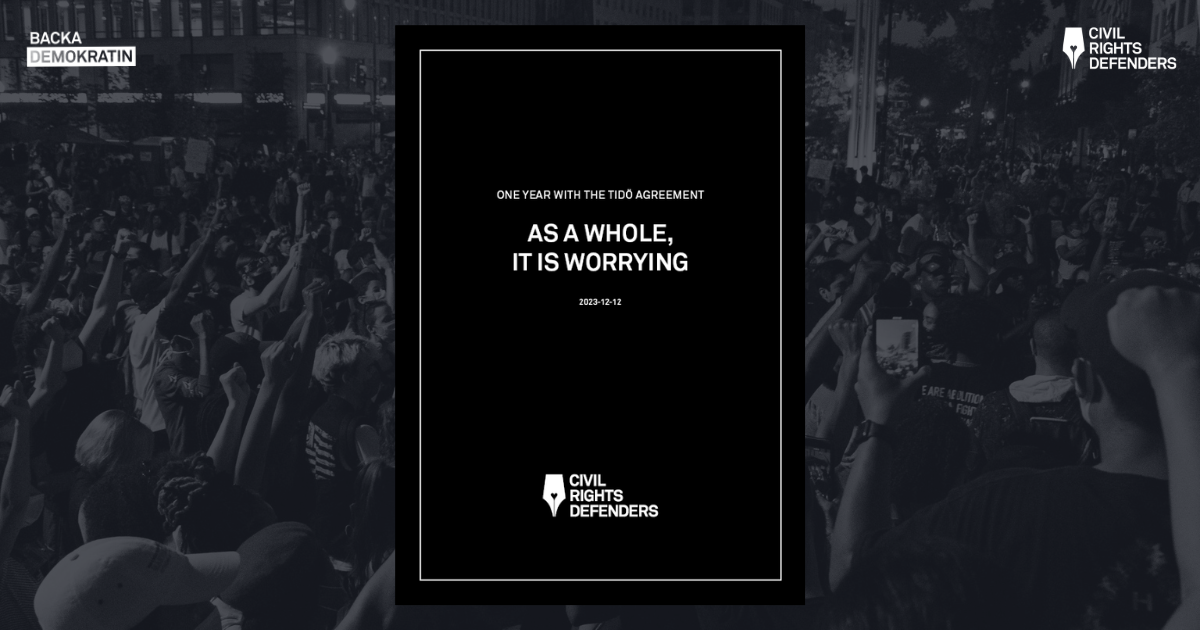Report “As a whole, it is worrying – One year with the Tidö Agreement”

In recent decades, a trend of democratic backsliding (also known as autocratisation) has swept across the world. In a new report, we examine last year’s developments from the Tidö Agreement from a democracy and human rights perspective. Because it is important for us to ask, can we see signs of democratic backsliding even in Sweden?
When the Tidö Agreement was presented in October 2022 by the then newly-appointed government (who had the support of the Sweden Democrats), we published a rights-based review of the agreement. In it, we wrote: “We do not know yet which of them will become law, or in what form; however, the measures of the agreement indicate a concerning direction and cause serious alarm.” A year later, it’s time to put that claim to the test.
As a human rights organisation focusing on the defence of civil and political rights, we have watched with concern the proposal or passage of legislative measures that restrict or conflict with fundamental freedoms and rights in recent years. We have also seen how groups in society are increasingly singled out as threats that must be combated.
The past year has been characterised by crisis and uncertainty in Sweden and our surroundings. We are facing considerable challenges that may require extraordinary measures and significant long-term resources during which freedoms and rights must be weighed against each other. The state can curtail freedoms and rights within certain limits in times of crisis. Still, it is of the utmost importance to simultaneously protect democratic rights and principles–and not enact laws that risk undermining them. There is also a risk that when fundamental freedoms and rights are restricted, acceptance increases for it to happen again – and the threshold for what legitimises restrictions is gradually lowered. There is a risk that laws may be enacted in the future that could be used against other groups and for different purposes. This must be taken very seriously.
As a whole – it is worrying
During the first year of the Tidö Agreement, numerous proposals have been put forward that conflict with fundamental freedoms and rights, especially in regard to criminal and migration policies. These are examined in this report. Additionally, several proposals and decisions have been made that individually may not necessarily pose an immediate threat to democracy, but when considered together and over time, they risk weakening democracy. This includes increased political control over government agencies, restrictions on freedom of association, and freedom of speech.
Some examples:
- Decisions, proposals, and statements that, in various ways, restrict rights or undermine important principles in the rule of law. Stop-and-search zones undermine equality before the law and increase the risk of discrimination. Anonymous witnesses jeopardise the right to a fair trial. Evicting entire families if a child has committed a crime constitutes collective punishment. In our report, many of these measures are thoroughly examined.
- Proposals for reforms and statements aimed at increasing political control and reducing the independence of government agencies. This includes decreasing board term length at state educational institutions, using appointment powers to implement the announced paradigm shift, and, most recently, the proposal that non-political officials implementing the Tidö Agreement may receive higher salaries.
- Proposals and statements that limit freedom of association and freedom of speech. This includes threats of withdrawing funding for civil society organisations with critical opinions and significant restrictions on support for civil society (in both aid, adult education, and voluntary organisations).
- Proposals and statements that are direct attacks on independent media and may discourage critical scrutiny of those in power. This includes proposals that risk creating more opportunities for political control and sanctions against journalists within public service, as well as sweeping and unfounded accusations of bias.
- Proposals and statements that risk decreasing trust in society and increasing distrust among citizens. The Reporting Act is a clear example, but also several proposals and statements that cast suspicion and blame people with migration backgrounds or equate crime with migration.
Most of the proposals are directed to be “rapidly investigated.” This endangers legal certainty as it reduces the possibility of a comprehensive response procedure and impact analysis. The measures implemented must be predictable, proportionate, and non-discriminatory. Legislation restricting fundamental freedoms and rights should also be time-limited so that the restrictions do not become permanent and can be appropriately reevaluated.
At the same time, we hear alarming political rhetoric that politicises and threatens critical voices in civil society, while vulnerable groups are singled out as scapegoats by political leaders. This development risks weakening Sweden’s democracy and may be the first step in the process known as autocratisation – the opposite of democratisation. Established democracies are not immune to autocratisation.
We need to look at the big picture. Even though some reforms may seem justified, in their entirety they could reduce democratic space and lead us towards increased autocratisation. The responsibility to counteract this development lies with all holders of power and parliamentary parties.
Sweden’s democracy is still strong, especially compared to other countries in the world. But we must never take it for granted. Democracy is only as strong as those who choose to stand up for it.
About the report
Based on the freedoms and rights that Sweden has committed to follow, we examined a selection of proposals and statements presented in the past year, as outlined in the Tidö Agreement. Several similar proposals have been put forward by previous governments, but the focus and scope of this report primarily centre on the year following the publication of the Tidö Agreement. The principles of the rule of law, as well as legal certainty, are important perspectives in the analysis. The areas primarily addressed are criminal policy and migration policy. The report also includes overarching analyses of potential consequences for Sweden’s democracy.
Download the introduction and summary hereRead and download the entire report (in Swedish) here.


